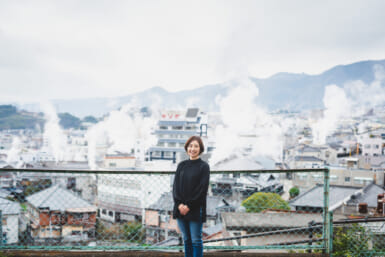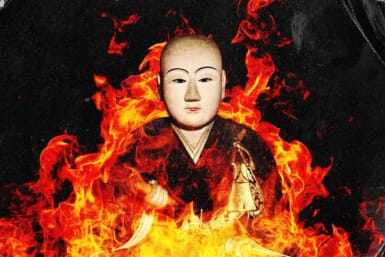by James Bailey
English is a required subject for six years of Japanese public school and the inspiration for study aids ranges from toilet paper imprinted with useful phrases to cookies imprinted with useful vocabulary quizzes to topless instructors.
The Shinjuku Mitsumine Career Academy in Tokyo has entered the field of creative language instruction with classes in which the required text is not a grammar book but a cook book. Meeting once a week for 90 minutes, students learn English through discussion and preparation of various dishes from around the world. With only a pinch or dash of creativity, cuisine-specific vocabulary can be adapted to everyday situations, as in, “Nice to meat you. It’s hot as an oven today, isn’t it?”
Also getting into the act, and we emphasize the word “act,” is a school in northwest Tokyo where the mother tongue of Bogart and Monroe is learned by watching movies. Deathless lines of dialogue from favorite features, coupled with tantalizing references to cooking, can result in memorable phrasemaking, provided the phrasemaker is careful not to mix the two haphazardly. Remember, stifled giggles or puzzled stares will be the likely reactions to “Go ahead, bake my day.”
For those who wish to learn English-language film dialogue in the privacy of their own home studios, there is CINEX, or Cinema English Exercise. Whereas virtually all foreign films released theatrically in Japan are subtitled in Japanese, CINEX videos of English-language films are subtitled in English. Thus, says a spokesman for the distributor of the videos, “busy businessmen can kill two birds with one stone: enjoy a film and learn English at the same time.”
Using the pause and rewind buttons on his VCR, the serious student can give particularly close attention to those phrases he’s most likely to use with foreign tourists who ask him for directions: “You talkin’ to me?” and “Frankly, my dear, I don’t give a damn.”
Those who prefer being taught such useful English by people rather than by videos can enroll in a school in Harajuku which boasts that six of its female instructors are professionally trained actresses from Hollywood and Broadway. We note for the record that this particular institution doesn’t say how often its professionally trained actresses have actually been professionally employed as actresses, rather than as waitresses.
An organization called the Kyu English Club offers yet another wrinkle, or perhaps one should say tinkle, since it affords students the opportunity to learn over the phone. There are at least as many advantages to this pedagogical method as there are digits in a direct-dial call to Brunei, but space permits naming only three of them.
First, busy types don’t have to spend valuable time going to and from school. Second, since the school operates from 7 a.m. to 11 p.m., lessons priced as low as ¥300 for 15 minutes can be fitted easily into your lunch hour, your afternoon coffee break or even your late-night soak in the tub. And third, instruction is one-on-one, yet you don’t have to look the teacher in the eye when you explain how the dog ate your homework.
You’ll also be glad to learn that this method of telephonic instruction has been approved by the Switch-board of Education.







